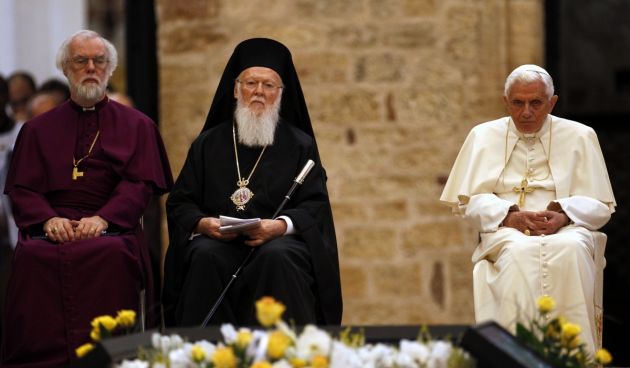Archbishop of Canterbury to visit Ecumenical Patriarch in Istanbul

The Archbishop of Canterbury, Justin Welby, is traveling to Istanbul on Monday to visit the man considered by many as the spiritual head of Eastern Orthodox Christians, Ecumenical Patriarch Bartholomew.
A statement on the Anglican Communion website says, "Archbishop Justin hopes that the visit will help to develop greater fellowship between the two churches and contribute to the goal of Christian unity."
The two day visit will include the first meeting in Istanbul between the Ecumenical Patriarch and Welby, who once worked in the banking and oil industry, since he became Archbishop of Canterbury.
Welby was enthroned as spiritual head of the Church of England and symbolic head of the 80-million strong Anglican Communion in March 2013.
"As Archbishop of Constantinople and New Rome, Ecumenical Patriarch Bartholomew occupies the First Throne of the Orthodox Christian Church," says the Anglican Communion website.
The Ecumenical Patriarch is Archbishop of Constantinople and New Rome, and is a Greek Orthodox who is the first among equals in the Eastern Orthodox communion, which has a number of patriarchates.
Eastern Orthodox churches are member of the World Council of Churches which represents more than 500 million Christians from mainly Anglican, Orthodox and Protestants traditions.
Welby attended the 10th Assembly of the WCC held in Busan, South Korea in November and he had a meeting at the Vatican with Pope Francis in June 2013.
On Saturday Pope Francis greeted clergy and laity from the Orthodox Churches and Eastern Orthodox Churches, who are completely their theological formation in Rome at Catholic Institutions.
"Not guests but brothers among brothers," said Francis at a celebration for the 50th anniversary of the institution of the Catholic Committee for cultural collaboration with Orthodox Churches and Eastern Orthodox Churches.
Bartholomew I is a proponent of ecumenical and interfaith dialogue and his title goes back to the 6th century AD.
RUSSIAN ORTHODOX
The Russian Orthodox is numerically the biggest of the Eastern Orthodox churches and it does not agree with the Ecumenical Patriarchate on the first among equal interpretation from the archdiocese of Bartholomew.
In a statement on January 7 the Ecumenical Patriarchate said, "In a recent synodal decision, the Church of Russia seems once again to choose its isolation from both the theological dialogue with the Roman Catholic Church and the communion of the Orthodox Churches."
The Russian Orthodox Church had earlier posted on its website a message that said, "The problem of primacy in the Universal Church has been repeatedly raised during the work of the Joint International Commission on Theological Dialogue Between the Orthodox Church and the Roman Catholic Church."
The 73-year-old Ecumenical Patriarch pursued postgraduate studies at the Pontifical Oriental Institute in Rome, the Ecumenical Institute of Bossey in Switzerland and the Ludwig Maximilians University of Munich in Germany.
After completing a doctoral research on the Canon Law, he was a lecturer in the Pontifical Gregorian University in Rome.
He is unlikely to agree with the attitude of some churches in the Anglican Communion that recognize same-sex marriage and on the issuue of female ordination.
In a Patriarchal Encyclical delivered on December 23 Bartholomew said, "So the Lord appointed the marriage of male and female in the blessed family. The institution of Christian family constitutes the cell of life and an incubator for the spiritual and physical health and development of children.
"Therefore, the manifold support of the institution of the family comprises the obligation of the Church and responsibility of leadership in every country."
The Anglican Communion is deeply divided on the issue of homosexuality with some churches in it bitterly opposed to the ordination of gay pastors and others recognizing same sex-sex marriage. Some of its churches are also opposed to female ordination as a Orthodox churches.
Churches in the Orthodox tradition recognize marriage as being between a man and a woman as does the Roman Catholic Church and the Church of England.